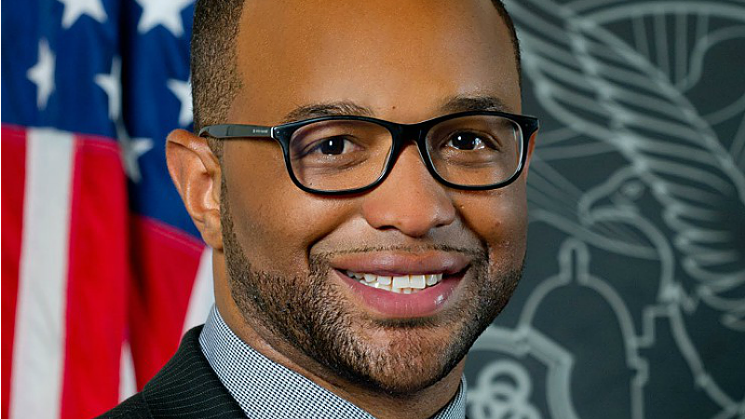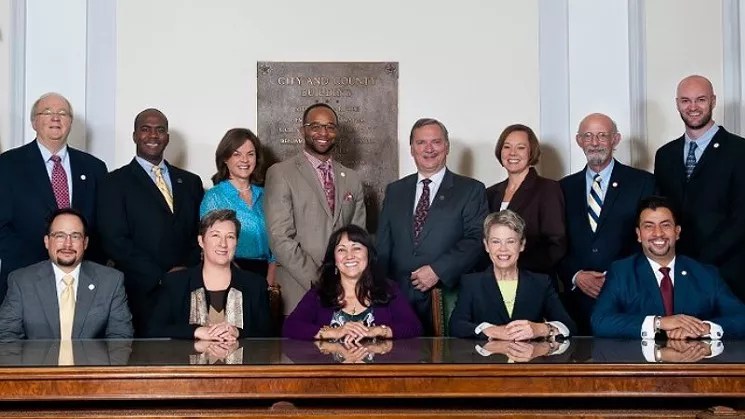
Nicole Daniels | Body & Glass Photography

Audio By Carbonatix
The theory that Denver City Council isn’t that into investigating Mayor Michael Hancock for possible sexual harassment against Detective Leslie Branch-Wise during the 2011-2012 period when she was on his security detail got a boost yesterday evening, March 29, when council president Albus Brooks released a statement revealing that he and his colleagues are still mulling over whether to launch an inquiry, and suggesting strongly that whatever happens will take place beyond public view. Accompanying these remarks was a collection of frequently asked questions about the case – some surprising, others indicating that plenty of ass-covering is under way.
The FAQs are on view below in their entirety.
The prospect of the council staging a public hearing into Hancock’s actions took a hit in recent days thanks to a passage in a March 22 letter to Sean Lane, Branch-Wise’s attorney, penned by legislative counsel Kirsten Crawford. Wrote Crawford: “We understand that your request is for an ‘open’ investigation but sexual harassment investigations are normally conducted in a privileged and confidential manner.”
Brooks doubled down on this theme in his statement, sent out just shy of 6 p.m. on March 29 by Stacy Simonet, the city’s administrator of communications and technology solutions. The words of the council president came a day later than anticipated, supposedly because city websites were plagued by a bug for much of March 28.
Here’s what Brooks had to say:
On Tuesday, council members spent nearly three hours in executive session discussing the request by Detective Branch-Wise to investigate the texts she received from Mayor Hancock in 2006. Council continues to deliberate over her request and receive legal advice from our own city attorney. Council is a deliberative body made up of 13 members and we do not expect to come to any conclusions until next week at the earliest. Sexual harassment investigations are required by state law to be private, with that understanding we will be responding privately to Detective Branch-Wise and her attorney once Council has finished deliberating.

Denver City Council president Albus Brooks.
File photo
The three variations on the word “deliberate” are apparently intended to demonstrate that the council is thinking long and hard about what to do, as opposed to putting off an awkward decision for as long as possible. However, the reference to state law in regard to sexual-harassment investigations is clear: Even if Branch-Wise, the victim in the case, wants to put everything on the table before Denver’s citizens, council won’t be able to do so.
As for the frequently asked questions, several cover points that have been hammered home again and again since the late-February revelations from Branch-Wise. For example, council can’t remove Hancock from office even if it’s found that he sexually harassed the detective rather than unintentionally blurred the lines between friend and colleague, as he maintains. Moreover, Branch-Wise’s 2013 settlement involving alleged bad behavior by onetime Hancock friend Wayne McDonald (who received his own $200,000 payout from the city three years later) precludes her from suing anyone else in Denver government – such as the mayor.
Other items are more surprising – like the fact that Denver doesn’t have a formal process to investigate an elected official for sexual harassment. (Check your calendar and you’ll discover that, yes, it is 2018.) Additionally, Denver City Council has not previously tracked sexual-harassment discipline or settlements – and there have been plenty of the latter in recent years: Look no further than former assistant city attorney Stuart Shapiro, who was paid $660,000 in 2016 after being kept on paid leave for more than a year and a half.
In Shapiro’s words, the city “made a bad mistake, and instead of talking to the press and saying, ‘We are so sorry,’ they just kept trying to shoot me until I didn’t move anymore. It was crazy.”
Continue to read the FAQs shared by Brooks.

The thirteen members of the Denver City Council.
File photo
Frequently Asked Questions
Does City Council have the power to remove or discipline the Mayor?
Under Denver’s Charter, only the voters can remove an elected official from office.
The City Council (the legislative branch of government) and the Mayor (the executive) are separate branches of government and the powers of each are limited by the City Charter. In Denver, like most cities and states, one branch of government does not have the power to remove or discipline an elected official serving in another branch of government.
Could the Mayor be held legally accountable through other processes?
Detective Branch-Wise and the City of Denver signed a Settlement and Release of Claims in 2013 which limits what legal processes remain available to her.
What if any power does the City Council have?
The Council has power granted to it in the Charter “to investigate any Department of the City and County and the official acts and conduct of any officer thereof, and may compel the attendance and testimony of witnesses and the production of books and documents.” Section 3.2.3. of the City Charter.
What would be the purpose of conducting a sexual harassment investigation?
The main purposes for conducting sexual harassment investigations include:
• stopping the harassing behavior,
• disciplining the offender,
• and preventing employer liability.
What are the steps to request a sexual harassment investigation into an elected official?
There isn’t a formal process for requesting a sexual harassment investigation into an elected official.
In this case, Council has requested a statement setting forth the facts that are to be investigated.
Would an investigator draw a legal conclusion as to whether the Mayor sexually harassed Detective Branch-Wise?
The purpose of a sexual harassment investigation is to determine whether the alleged conduct occurred, not to determine whether the alleged conduct rises to the level of sexual harassment which is a legal definition to be determined by a court of law. This is why most sexual harassment investigations end with the conclusion that it is more likely than not that an action occurred.
Should an investigation into the Mayor’s conduct be handled by an independent entity or third-party investigator?
If a written complaint was filed and Council voted to investigate the complaint they would then request the Executive Branch hire a third party to ensure an investigation was neutral and unbiased.
Should Council’s investigatory powers be used to subpoena the Mayor to determine what his intentions were in sending the text messages to Detective Branch-Wise that have been made available to the public?
Intention is not relevant to a determination of whether sexual harassment has occurred.
Should Council’s investigatory powers be used to question Detective Branch-Wise under oath?
If a formal complaint was filed and if the Council voted to investigate, that investigation would be handled by a neutral third-party investigator.
What Is Council learning that we should do differently?
The City did not keep statistics on sexual harassment discipline or settlements previously, many of which do not come to Council for approval. That is being rectified to ensure the City overall and Council specifically can monitor whether there are any troubling trends.
City Council will clarify our own agency policy to ensure there is a clear path for employees to report any concerns, including against elected Council members. City Council strongly encourages other City elected officials to adopt similar policies.
A clearer policy and path for complaints against all elected officials must be developed.
City Council is reviewing City Attorney practices in past large settlements.